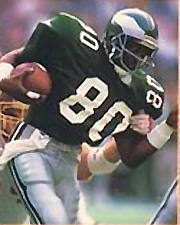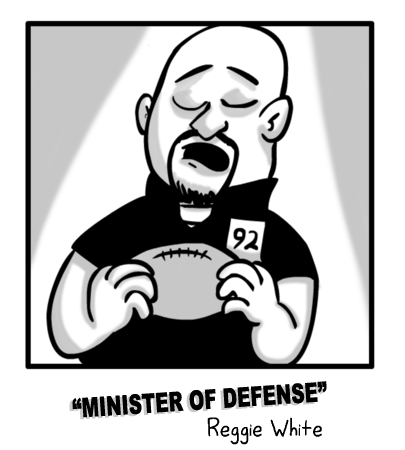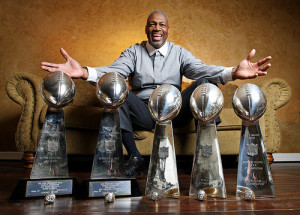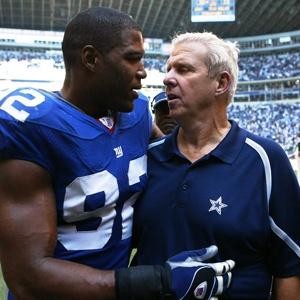Posted on
August 02, 2013 by
Dean Hybl

Though best remembered for his years as a Viking, Carter started his career with three seasons as a member of the Philadelphia Eagles.
When I met Cris Carter in July 1989 there was little doubt that he had the ability to one day be a Hall of Fame wide receiver. However, after spending six months around him during the 1989 season I would have put his chances of actually ever living up to that potential somewhere between none and less than none.
So, it is quite amazing (and a testament to how people can change) that 24 years later Carter will indeed be inducted into the Pro Football Hall of Fame this weekend in Canton, Ohio.
Talent was never the problem for Carter. The brother of former Indiana University and NBA player Butch Carter, Cris was a great multi-sport athlete and heavily recruited as both a basketball and football player.
An Ohio native, he chose to stay in state and attend Ohio State University. Originally Carter planned on playing both sports in college, but after setting a Rose Bowl record with nine catches for 172 yards during his freshman year, he decided to concentrate on football.
By his junior season in 1986 Carter was a consensus All-American and had already set the Ohio State record for career receptions.
However, as a harbinger of things to come, Carter was declared ineligible for his senior season after it was discovered that he had signed a contract with sports agent Norby Walters.
Allowed to enter the NFL through a supplemental draft, Carter was selected in the fourth round by the Philadelphia Eagles.
Under the direction of colorful head coach Buddy Ryan and sporting an exciting roster of young stars including Reggie White, Randall Cunningham, Jerome Brown, Mike Quick and Keith Byars, the Eagles were a team on the rise. As a rookie, the 21-year-old Carter saw very limited action during the strike-shortened season. He played in nine games and caught five passes for 84 yards and two touchdowns.
The next season he moved into the starting lineup and was a key performer on an Eagles team that won the NFC East and reached the playoffs for the first time since the 1981 season. Carter caught 39 passes for 761 yards (19.5 ypc) and six touchdowns.
By 1989, Carter seemed to be on a path to greatness, but few realized that he was actually on a path to self-destruction.
It was at that time during the summer of 1989 that I joined the Eagles as a Public Relations intern fresh out of college at James Madison University, where I had worked in the school’s sports information office and covered the football team for the school newspaper.
Spending the season as an intern with an NFL team was a dream come true, but while most of the Philadelphia players were great to work with, dealing with Carter was often more of a nightmare.
Unbeknownst to most of his teammates (or PR interns), it turns out that while Carter acted with great confidence (some would call it cockiness) on the field and in the locker room, he was actually losing a personal battle with substance abuse.
In hindsight, it actually makes sense that Carter was dealing with such demons. When I would make my daily trips to the locker room, you never knew which Carter you were going to run into. Sometimes he was engaging, friendly and helpful, however, more often he was difficult, condescending and just plain mean.
As a 22-year-old from a rural part of Virginia, I had never dealt with anyone who was an alcoholic or drug addict, so while others may have been aware of his problems, I was completely naïve and just trying to fit into the professional world and eventually handled it by only going near him when I needed to as part of my job.
On the field in 1989 Carter became the “touchdown maker” for the Eagles. He caught 45 passes for 605 yards and 11 touchdowns. However, after catching eight passes for 113 yards in a Monday Night Football loss to the Chicago Bears in the fourth week of the season, he never caught more than four passes in a game the remainder of the season. Read the rest of this entry →
 Today’s Sports Then and Now blog remembers the late Reggie White.
Today’s Sports Then and Now blog remembers the late Reggie White.







